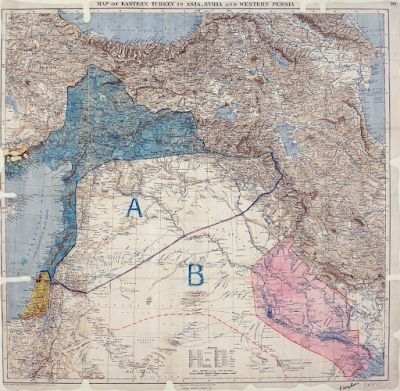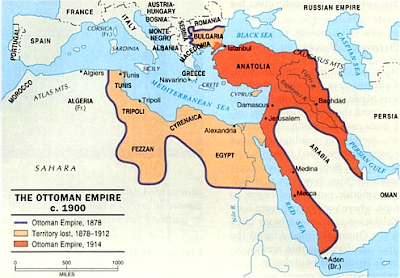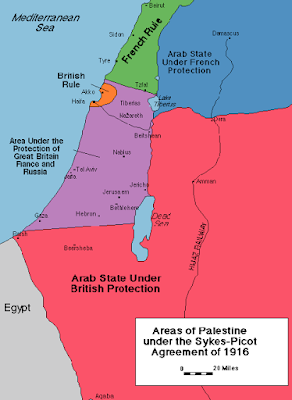This article was last updated on April 16, 2022
Canada: ![]() Oye! Times readers Get FREE $30 to spend on Amazon, Walmart…
Oye! Times readers Get FREE $30 to spend on Amazon, Walmart…
USA: ![]() Oye! Times readers Get FREE $30 to spend on Amazon, Walmart…
Oye! Times readers Get FREE $30 to spend on Amazon, Walmart…
I am hoping that this posting will help us all to better understand that geopolitical meddling by the world's most powerful nations can have long-term and unforeseeable impacts. This is particularly the case in the Middle East where over a century of interference by the colonial powers has created a multi-faceted powder keg.
Here is a historical map that summarizes the current problems in Iraq and Syria:
The Ottoman Empire, one of the largest Muslim empires in history, entered the First World War after Russia declared war on it. The Ottoman Empire ratified an alliance with Germany in August 1914 and entered the war on the side of the Central Powers which included Germany, Austria-Hungary and Bulgaria. Prior to the start of the First World War, this map shows the shrinking boundaries of the Ottoman Empire:
By 1915 – 1916, the governments of the United Kingdom and France were meeting secretly to discuss how they were going to divide up the Ottoman Empire after the end of the First World War. Francois-Georges Picot, a French diplomat secretly met with Sir Arthur Nicolson in both November and December of 1915 to partition Turkey, Syria, Palestine and Iraq according to these terms:
"It is accordingly understood between the French and British governments:
That France and Great Britain are prepared to recognize and protect an independent Arab states or a confederation of Arab states (a) and (b) marked on the annexed map, under the suzerainty of an Arab chief. That in area (a) France, and in area (b) great Britain, shall have priority of right of enterprise and local loans. That in area (a) France, and in area (b) great Britain, shall alone supply advisers or foreign functionaries at the request of the Arab state or confederation of Arab states.
That in the blue area France, and in the red area great Britain, shall be allowed to establish such direct or indirect administration or control as they desire and as they may think fit to arrange with the Arab state or confederation of Arab states.
That in the brown area there shall be established an international administration, the form of which is to be decided upon after consultation with Russia, and subsequently in consultation with the other allies, and the representatives of the Shariff of Mecca.
That great Britain be accorded (1) the ports of Haifa and Acre, (2) guarantee of a given supply of water from the Tigres and Euphrates in area (a) for area (b). His majesty's government, on their part, undertake that they will at no time enter into negotiations for the cession of Cyprus to any third power without the previous consent of the French government.
That Alexandretta shall be a free port as regards the trade of the British empire, and that there shall be no discrimination in port charges or facilities as regards British shipping and British goods; that there shall be freedom of transit for British goods through Alexandretta and by railway through the blue area, or (b) area, or area (a); and there shall be no discrimination, direct or indirect, against British goods on any railway or against British goods or ships at any port serving the areas mentioned.
That Haifa shall be a free port as regards the trade of France, her dominions and protectorates, and there shall be no discrimination in port charges or facilities as regards French shipping and French goods. There shall be freedom of transit for French goods through Haifa and by the British railway through the brown area, whether those goods are intended for or originate in the blue area, area (a), or area (b), and there shall be no discrimination, direct or indirect, against french goods on any railway, or against french goods or ships at any port serving the areas mentioned.
That in area (a) the Baghdad railway shall not be extended southwards beyond Mosul, and in area (b) northwards beyond Samarra, until a railway connecting Baghdad and Aleppo via the Euphrates valley has been completed, and then only with the concurrence of the two governments.
That great Britain has the right to build, administer, and be sole owner of a railway connecting Haifa with area (b), and shall have a perpetual right to transport troops along such a line at all times. It is to be understood by both governments that this railway is to facilitate the connection of Baghdad with Haifa by rail, and it is further understood that, if the engineering difficulties and expense entailed by keeping this connecting line in the brown area only make the project unfeasible, that the french government shall be prepared to consider that the line in question may also traverse the Polgon Banias Keis Marib Salkhad tell Otsda Mesmie before reaching area (b).
For a period of twenty years the existing Turkish customs tariff shall remain in force throughout the whole of the blue and red areas, as well as in areas (a) and (b), and no increase in the rates of duty or conversions from ad valorem to specific rates shall be made except by agreement between the two powers…"
With this agreement, in one fell swoop, the British laid claim to the oil-rich territory in Iraq.
The final agreement was signed on May 16, 1916 and became known as the Sykes-Picot Agreement or the Asia Minor Agreement. France was to exercise control over the Blue Zone which included Cilicia, the coastal strip of Lebanon and Syria and the greater part of Galilee. Area A was to be created as an Arab state under French protection. The British were to control the Red Zone which included southern Mesopotamia and the territory around the Acre-Haifa bay on the Mediterranean coast. As well, the British had the rights to build a railway from there to Baghdad in present day Iraq. Area B was to be created as an Arab state under British protection. The remaining Zone which covered the Sanjak of Jerusalem running south to a line running from Gaza to the Dead Sea was to be under international administration (British, French and Russian) and was known as the Brown Zone.
Here is a closeup of the region around present day Israel and how the Sykes-Picot Agreement carved up the region:
With the exception of the line running along the Jordan River, for the most part the lines used to carve up the territory were drawn with a ruler, totally disregarding any traditional or tribal/ancestral divisions. This was typical of the colonial thinking at the time and was rife throughout Africa.
Sykes-Picot received a great deal of criticism, largely because it ignored the Zionist wishes of the Jewish population.
Now that we have that background, let's move to more recent times. On June 29, 2014, a militant group known as ISIS proclaimed a caliphate (khilafah) in the region straddling the borders between Syria and Iraq, a region that was split into two parts by Sykes-Picot. With the proclamation of the caliphate, ISIS through Al Hayat released this video to announce the destruction of the border between Iraq and Syria. The English language video entitled "The End of Sykes-Picot" outlines the ideology of ISIS; an ideology that prioritizes the conquering and governing of territory, particularly al Sham (Syria) in sharp contrast to al-Qaeda, a group that has shown little interest in governance. In a key sentence in the video, you will note that the presenter states that "there is no border" (between Syria and Iraq). In the Arabic language version of the same video, entitled Kaser-al-Hudud, the presenter states that:
"Today we are happy to participate in destroying the borders placed by the tawaghit (oppressors) to prevent the Muslims from traveling in their lands. The tawaghit broke up the Islamic Khilafah and made it into countries like Syria and Iraq, ruled by man-made laws. Alhamdulillah, Allah blessed the mujahidin with destruction of these borders. Thereby the mujahidin were able to show their strength, by Allah’s grace. . . Alhamdulillah, today we begin the final stage after the Ummah was divided. Alhamdulillah, we’ve begun today to unite in the face of the plots of the kuffar. Their plot was to divide and conquer. That is what they had done with us."
During the English language version, the militant presenter makes the following observation (7 minute 35 second mark):
"Look how much money America spends to fight Islam, and it ends up being in our pockets…the United States, lost its wars in Iraq and Afghanistan…they will lose in Syria as well, inshallah. We will be ready for them.”
ISIS' selection of Sykes-Picot as a key issue that it can use to recruit new members and raise money for its cause appeals to those living in the region (and elsewhere) who are adverse to a long history of foreign intervention in the region. The ten year-long "intervention" in Iraq by the Coalition of the Willing is just the latest in a line of foreign policies that have not turned out quite like western governments had hoped.
Let's close with this quote from the Arabic version of the video:
"It is time for the sons of the Islamic State and the Ummah to defend the Islamic State of Iraq and Sham, and defend our Imam who the world gathered against with all its strength, yet he did not turn back a single step. Rather he advanced and opened our path for us. It is obligatory upon us in front of Allah to complete this work and establish the khilafah. . . Our goal is clear. Everyone knows why we fight. Our path is to khilafah. We will revive the khilafah. . . Isn’t it enough that your brothers implement Allah’s law for Allah’s word to be the highest, and that they rule by the Shari’ah?"
Perhaps the biggest attraction for foreign fighters joining the Islamic State is not necessarily a religious one, rather, it is a long-held grudge against the colonial nations which divided the region with a ruler rather than with any cultural sensitivity.
Click HERE to read more of Glen Asher's columns
You can publish this article on your website as long as you provide a link back to this page.




Be the first to comment